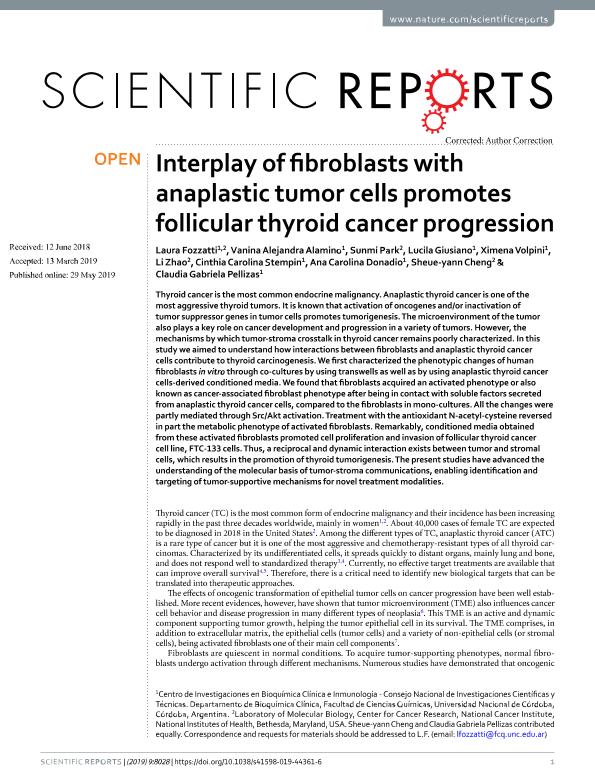Mostrar el registro sencillo del ítem
dc.contributor.author
Fozzatti, Laura

dc.contributor.author
Alamino, Vanina Alejandra

dc.contributor.author
Park, Sunmi
dc.contributor.author
Giusiano, Lucila

dc.contributor.author
Volpini, Ximena

dc.contributor.author
Zhao, Li
dc.contributor.author
Stempin, Cinthia

dc.contributor.author
Donadio, Ana Carolina

dc.contributor.author
Cheng, Sheue-yann
dc.contributor.author
Pellizas, Claudia Gabriela

dc.date.available
2021-03-22T19:40:17Z
dc.date.issued
2019-05
dc.identifier.citation
Fozzatti, Laura; Alamino, Vanina Alejandra; Park, Sunmi; Giusiano, Lucila; Volpini, Ximena; et al.; Interplay of fibroblasts with anaplastic tumor cells promotes follicular thyroid cancer progression; Nature Publishing Group; Scientific Reports; 9; 1; 5-2019; 1-15
dc.identifier.issn
2045-2322
dc.identifier.uri
http://hdl.handle.net/11336/128760
dc.description.abstract
Thyroid cancer is the most common endocrine malignancy. Anaplastic thyroid cancer is one of the most aggressive thyroid tumors. It is known that activation of oncogenes and/or inactivation of tumor suppressor genes in tumor cells promotes tumorigenesis. The microenvironment of the tumor also plays a key role on cancer development and progression in a variety of tumors. However, the mechanisms by which tumor-stroma crosstalk in thyroid cancer remains poorly characterized. In this study we aimed to understand how interactions between fibroblasts and anaplastic thyroid cancer cells contribute to thyroid carcinogenesis. We first characterized the phenotypic changes of human fibroblasts in vitro through co-cultures by using transwells as well as by using anaplastic thyroid cancer cells-derived conditioned media. We found that fibroblasts acquired an activated phenotype or also known as cancer-associated fibroblast phenotype after being in contact with soluble factors secreted from anaplastic thyroid cancer cells, compared to the fibroblasts in mono-cultures. All the changes were partly mediated through Src/Akt activation. Treatment with the antioxidant N-acetyl-cysteine reversed in part the metabolic phenotype of activated fibroblasts. Remarkably, conditioned media obtained from these activated fibroblasts promoted cell proliferation and invasion of follicular thyroid cancer cell line, FTC-133 cells. Thus, a reciprocal and dynamic interaction exists between tumor and stromal cells, which results in the promotion of thyroid tumorigenesis. The present studies have advanced the understanding of the molecular basis of tumor-stroma communications, enabling identification and targeting of tumor-supportive mechanisms for novel treatment modalities.
dc.format
application/pdf
dc.language.iso
eng
dc.publisher
Nature Publishing Group
dc.rights
info:eu-repo/semantics/openAccess
dc.rights.uri
https://creativecommons.org/licenses/by-nc-sa/2.5/ar/
dc.subject
Fibroblasts
dc.subject
Thyroid cancer
dc.subject
IL6
dc.subject
ROS
dc.subject.classification
Bioquímica y Biología Molecular

dc.subject.classification
Ciencias Biológicas

dc.subject.classification
CIENCIAS NATURALES Y EXACTAS

dc.title
Interplay of fibroblasts with anaplastic tumor cells promotes follicular thyroid cancer progression
dc.type
info:eu-repo/semantics/article
dc.type
info:ar-repo/semantics/artículo
dc.type
info:eu-repo/semantics/publishedVersion
dc.date.updated
2020-11-19T21:16:41Z
dc.journal.volume
9
dc.journal.number
1
dc.journal.pagination
1-15
dc.journal.pais
Estados Unidos

dc.description.fil
Fil: Fozzatti, Laura. Consejo Nacional de Investigaciones Científicas y Técnicas. Centro Científico Tecnológico Córdoba. Centro de Investigaciones en Bioquímica Clínica e Inmunología; Argentina
dc.description.fil
Fil: Alamino, Vanina Alejandra. Consejo Nacional de Investigaciones Científicas y Técnicas. Centro Científico Tecnológico Córdoba. Centro de Investigaciones en Bioquímica Clínica e Inmunología; Argentina
dc.description.fil
Fil: Park, Sunmi. National Institutes of Health; Estados Unidos
dc.description.fil
Fil: Giusiano, Lucila. Consejo Nacional de Investigaciones Científicas y Técnicas. Centro Científico Tecnológico Córdoba. Centro de Investigaciones en Bioquímica Clínica e Inmunología; Argentina
dc.description.fil
Fil: Volpini, Ximena. Consejo Nacional de Investigaciones Científicas y Técnicas. Centro Científico Tecnológico Córdoba. Centro de Investigaciones en Bioquímica Clínica e Inmunología; Argentina
dc.description.fil
Fil: Zhao, Li. National Institutes of Health; Estados Unidos
dc.description.fil
Fil: Stempin, Cinthia. Consejo Nacional de Investigaciones Científicas y Técnicas. Centro Científico Tecnológico Córdoba. Centro de Investigaciones en Bioquímica Clínica e Inmunología; Argentina
dc.description.fil
Fil: Donadio, Ana Carolina. Consejo Nacional de Investigaciones Científicas y Técnicas. Centro Científico Tecnológico Córdoba. Centro de Investigaciones en Bioquímica Clínica e Inmunología; Argentina
dc.description.fil
Fil: Cheng, Sheue-yann. National Institutes of Health; Estados Unidos
dc.description.fil
Fil: Pellizas, Claudia Gabriela. Consejo Nacional de Investigaciones Científicas y Técnicas. Centro Científico Tecnológico Córdoba. Centro de Investigaciones en Bioquímica Clínica e Inmunología; Argentina
dc.journal.title
Scientific Reports
dc.relation.alternativeid
info:eu-repo/semantics/altIdentifier/url/https://www.nature.com/articles/s41598-019-44361-6
dc.relation.alternativeid
info:eu-repo/semantics/altIdentifier/doi/http://dx.doi.org/10.1038/s41598-019-44361-6
Archivos asociados
